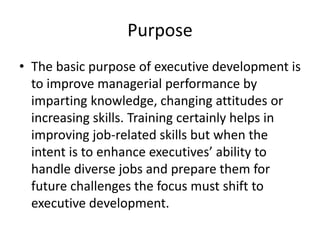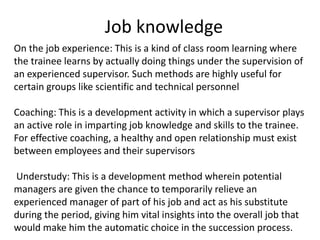Executive development l9
- 2. Definition • Executive or management development is a planned, systematic and continuous process of learning and growth by which managers develop their conceptual and analytical abilities to manage.
- 3. Purpose • The basic purpose of executive development is to improve managerial performance by imparting knowledge, changing attitudes or increasing skills. Training certainly helps in improving job-related skills but when the intent is to enhance executives’ ability to handle diverse jobs and prepare them for future challenges the focus must shift to executive development.
- 4. Features of Executive Development It is a planned effort to improve executives’ ability to handle a variety of assignments. It is not a one-shot deal, but a continuous, ongoing activity. It aims at improving the total personality of an executive. It aims at meeting future needs unlike training, which seeks to meet current needs. It is a long-term process, as managers take time to acquire and improve their capabilities. It is proactive in nature as it focuses attention on the present as well as future requirements of both the organisation and the individual.
- 5. Importance of Executive Development – Invaluable investment in the long run as it helps managers to acquire requisite knowledge, skills and abilities needed to handle complex situations in business – Enables executives to realize their own career goals and aspirations – Helps executives to step into superior positions easily – Assists executives in enhancing their people- management skills, taking a holistic view of various problems.
- 6. Methods 1. Decision-making skills (a) In-basket (b) Business game (c) Case study 2. Interpersonal skills (a) Role play (b) Sensitivity training (c ) Behaviour Modelling 3. Job knowledge (a) On-the-job experiences (b) Coaching (c) Understudy 4. Organisational knowledge (a) Job rotation (b) Multiple management 5. General knowledge (a) Special courses (b) Special meetings (c) Specific readings 6. Specific individual needs (a) Special projects (b) Committee assignments
- 7. Methods • In-basket: The trainee is asked to look into a number of papers such as memoranda, reports, telephone messages that typically confront a manager and respond appropriately. • Case-study: The participant is asked to take up a simulated business problem and take appropriate decisions. • Business games: It is a learning exercise representing a real-life situation where trainees compete with each other to achieve specific objectives.
- 8. Interpersonal skills • Role play: This is a technique that requires the trainee to assume different identities to learn how others feel under different circumstances • Sensitivity training: This is a method of changing behavior through unstructured group interaction. (also known as T-group training, where T stands for training) • Behaviour modelling: This is an approach that demonstrates desired behaviour and gives trainees the chance to practice and role-play those behaviours and receive feedback.
- 9. Behavior modeling • Learning points • Modeling • Role Play • Social Reinforcement • Transfer of Learning
- 10. Job knowledge On the job experience: This is a kind of class room learning where the trainee learns by actually doing things under the supervision of an experienced supervisor. Such methods are highly useful for certain groups like scientific and technical personnel Coaching: This is a development activity in which a supervisor plays an active role in imparting job knowledge and skills to the trainee. For effective coaching, a healthy and open relationship must exist between employees and their supervisors Understudy: This is a development method wherein potential managers are given the chance to temporarily relieve an experienced manager of part of his job and act as his substitute during the period, giving him vital insights into the overall job that would make him the automatic choice in the succession process.
- 11. Organisational knowledge Job rotation: Moving a trainee from job to job so as to offer cross training is called job rotation. The idea behind this is to give managers the required diversified skills and a broader outlook. Multiple management: It is a system in which permanent advisory committees of managers study problems of the company ,thereby gaining first hand experience of various important aspects of business and make recommendations to higher management.
- 12. General knowledge • Special courses, meetings, readings: In addition to the above, managers could also benefit by attending workshops organised by academic institutions, attending special meetings organised by various government and voluntary organisations and by reading specific articles relevant to their respective fields.
- 13. Specific individual needs Special projects: In this method, a trainee is put on a project closely related to the objectives of the department. Committee assignment: In this method, an ad hoc committee is appointed to discuss, evaluate and offer suggestions relating to an important aspect of business.
- 14. Other Off the Job Methods Conferences: A conference is a meeting of people to discuss a subject of common interest. The participants exchange notes, opinions and ideas on the subject in a systematic and planner manner. Lectures: Lectures are formal presentations on a topic by an experienced and knowledgeable person. The presentation is generally supported by discussions, case studies, audio-visual aids and film shows. Group discussion: In this method, papers are presented by two or three trainees on a selected topic, followed by thought- provoking discussions. Programmed instruction: This is a learner-oriented technique which presents subject matter to the trainees in small sequential steps requiring frequent responses from the trainee and immediately offering him of their accuracy or otherwise.













